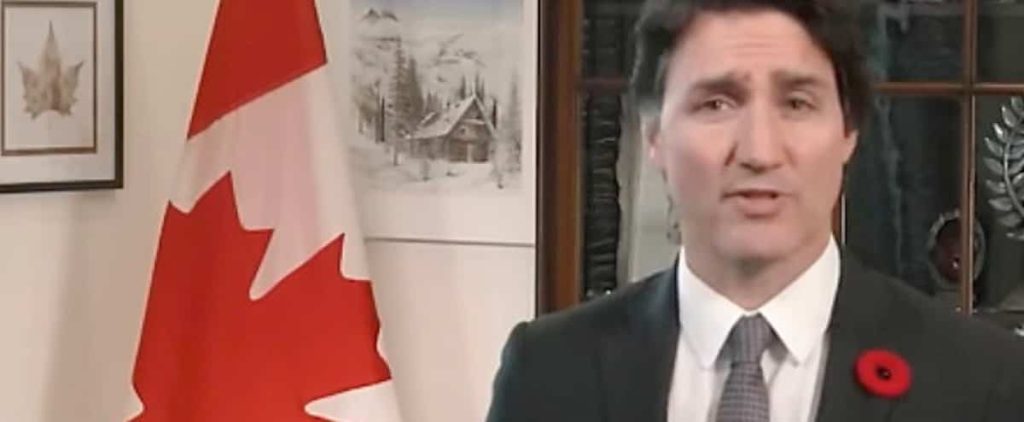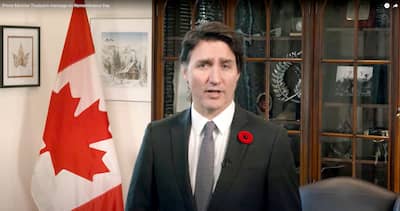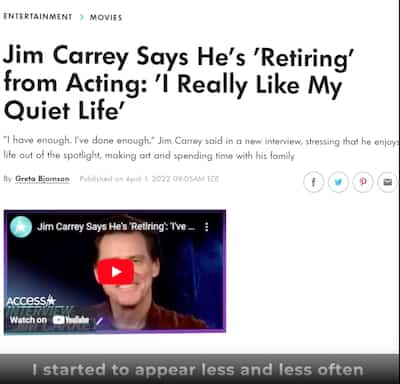
A video of Justin Trudeau edited by artificial intelligence is currently circulating in a scheme to defraud investors, further proving that the time has come to legislate.
The video is likely to use the Prime Minister's recorded message on Remembrance Day on November 11. While the images are real, Justin Trudeau's words have been edited.
“I'm Justin Trudeau, a partner at Royal Bank with a fortune of $200 million. I am currently recruiting a team of people making $2000 a day. I will personally pay $100,000 in damages to anyone who doesn't earn $30,000 in 30 days,” the prime minister's voice turns very confident.
The link invites you to enter your contact details to contact an advisor offering investment in cryptocurrency, which in fact turns out to be a scam.
A powerful tool
“As hyperfaking becomes more accessible and of better quality, we're going to see more and more of it [des arnaques de ce genre]», believes Akim Laniel-Lanani of the Cybercriminology Clinic, a partner of the University of Montreal.
Mr. Laniel-Lanani recalled that fake online news stories using images of people — including Justin Trudeau — had been appearing for some time. The link below goes to the scammers site.
“This type of fraud already exists in a more consistent form. But I see content like this [à la vidéo truquée de Justin Trudeau] Since October,” he pointed out.
According to him, the companies that distribute these ads and earn revenue from them should be partially responsible for the consequences of the fraud.
“In the United Kingdom, the Online Safety Act It was amended last fall to ensure that broadcasters are liable for fraud communicated through their services. The United Kingdom has discovered that we have given these web giants too much free reign, and so has it Far west online,” explains Akim Lanial-Lanani.
“In my opinion, Canada should legislate in a similar way so that the web giants limit access to and access to this type of content,” he argued.
Only one of the angles
Scams in particular are just one of the possibilities hyperfakes allow.
“It's very worrying,” said Mr Laniel-Lanani. It has already been used to influence elections, influence the conscience of Canadians and interfere.
The Prime Minister's Office has also expressed concern over this type of scandal, but has not responded to the government's intentions to legislate on the matter.
“We see this phenomenon taking up more and more space on platforms and malicious accounts spreading lies and misinformation. We are also seeing an increase in misinformation and false accounts targeting elected officials. This is unacceptable and worrying […]. We will continue to fight against misinformation and the actors in bad faith who exploit it,” press secretary Jenna Gassabe wrote.
The video was streamed on the phone app game. Turkey-based Fomo, the game's publisher, took the existence of these misleading ads seriously.
“Ads from various advertisers may appear in our games. We block ad content in certain objectionable categories, but ads may be served to different office circles. We track and block them manually,” Fomo wrote, inviting help in finding the ad.
Report scammers
To avoid financial fraud, Mr Laniel-Lanani recommends contacting the AMF before doing business with an online broker.
It also encourages people to report attempted scams to the Canadian Anti-Fraud Center and to fraud-alert.ca, the Cybercriminology Clinic's community support tool.
“It is not obvious to everyone. We cannot distinguish truth from falsehood on an equal footing. A lot of work needs to be done to raise awareness and warn people. Any advertisement on the Internet should be taken very carefully,” he stressed.
Let it happen
Tesler, the name used by the fraudulent company in a video featuring Justin Trudeau, has displayed another hyper-fake targeting Canadians on its website. This time he used an interview Elon Musk gave last April to HBO's Bill Maher.
Akim Lanial-Lanani has slammed the measures taken by web giants to tackle online fraud as “opaque”.
In Meta's ad library, which includes ads that run on Facebook, we see Tessler using Justin Trudeau's image in scams since January 2022.
Mr. Laniel-Lanani particularly discovered Tesler's hyperfaking, this time featuring actor Jim Carrey, which has been in circulation since January 10.










More Stories
Sportswear: Lolle acquires Louis Garneau Sports
REM is still innovative enough to foot the bill
A trip to the restaurant with no regrets for these customers